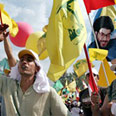
Hizbullah rally (Archives)
Photo: AP
Lebanon's political rivals have the will to keep violence in check for the parliamentary election in June, Interior Minister Ziad Baroud said on Saturday, adding that he expected the vote to be peaceful.
Dozens of people have been killed in the past two years in political violence and in May armed conflict erupted between Iranian-backed Shiite Hizbullah supporters and Sunni anti-Syrian followers.
"That's what I feel from the cabinet meetings, that's what I hear from the political groups and I have no reason to think that it is not going to be the case," Baroud told Reuters in an interview at the Interior Ministry in western Beirut.
"At the same time my job is to be concerned, my job is to do all the assessments needed in order to avoid any bad surprise," he said of the June 7 vote, the successful conclusion of which is seen as a milestone in Lebanese politics.
Baroud said some 30,000 police officers and army troops would be deployed around Lebanon on election day. There will be some 5,500 polling stations covering 26 electoral districts, where EU monitors are also expected to be present.
Powerful military and political group Hizbullah leads a pro-Syrian coalition that hopes to win a parliamentary majority now held by an anti-Syrian alliance, which has the support of the United States and Saudi Arabia.
Hizbullah wants national unity government
There are some fears that an incident ruining the vote is more likely to occur, especially since the vote will be held on one day - the first time since the civil war ended in 1990.
Baroud, a prominent lawyer and civil society activist who is neutral, was chosen by President Michel Suleiman to head the sensitive ministerial post.
Baroud said it was up to political groups to ensure that no disturbances occur. He does not believe rival parties will want to jeopardize a Doha-mediated deal in May that ended the crisis which brought Lebanon to the brink of civil war.
"Security-wise it's not about the number of soldiers or police officers you put on the streets. It has to do with the political will to undertake free elections without having any disturbance," he said.
Lebanon's 128-member parliament is allocated according to a complex sectarian power-sharing system, meaning the result of the vote will be decided by a handful of seats.
Hizbullah has predicted a narrow victory for itself and its allies, including Christian politician Michel Aoun. Parliamentary majority leader Saad al-Hariri has said he would not share power with his rivals in government if they win.
Hizbullah wants a national unity government after the vote. The current national unity government is marred by internal divisions which have held up economic and political reforms.
Baroud called for reforming the electoral law after the vote to allow for wider representation in parliament.
Baroud is not running for a seat and when asked if he would join the next government, he said: "If I can serve as minister, I would be glad to do it. If not, we will assess later."















